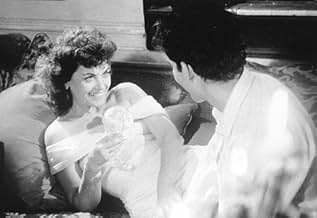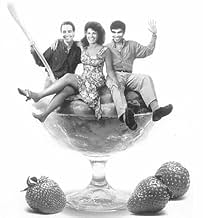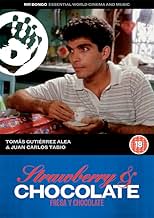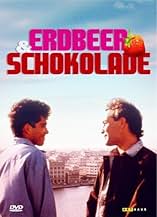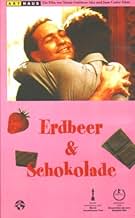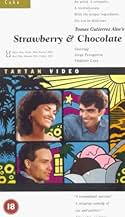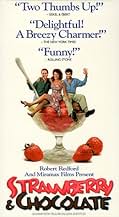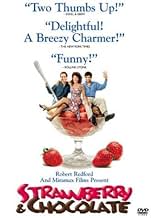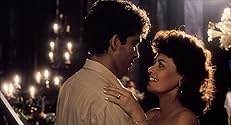ÉVALUATION IMDb
7,4/10
6,2 k
MA NOTE
Ajouter une intrigue dans votre langueStory of two men who are opposites: one gay, the other straight; one a fierce communist, the other a fierce individualist; one suspicious, the other accepting; and how they come to love each... Tout lireStory of two men who are opposites: one gay, the other straight; one a fierce communist, the other a fierce individualist; one suspicious, the other accepting; and how they come to love each other.Story of two men who are opposites: one gay, the other straight; one a fierce communist, the other a fierce individualist; one suspicious, the other accepting; and how they come to love each other.
- Nommé pour 1 oscar
- 25 victoires et 2 nominations au total
Avis en vedette
A beautiful movie for the heart. One of the most wonderful stories of friendship ever told.
Jorge Perugorría as Diego is amazing. (I'd well like to see some of his other work.) It is most astonishing to see how his character develops from the limp-wristed cliché gay at the beginning to a fascinating man who gets in conflict with the regime because he is different on every level from what the system requires him to be: he is an independent spirit, a person with a genuine love for the arts, for literature, for music, he is disappointed by communist ideals - and he is also gay, by the way.
Vladimir Cruz is also very fine as the young and naive David who discovers things through his friendship with Diego he'd never ever thought of: like discovering the beauty of things, of life, of poetry and music... And also being committed to another person, even though this person may seem very 'different' from oneself at first glance.
The development of David's and Diego's friendship is fascinating (I wouldn't interpret anything more into it, not even in the final scene). This is also a "coming of age" tale, in a way: by his friendship with Diego, David begins to think, develops a maturity of spirit - and is also, at last, able to develop a loving and mature relationship with a woman. It is very sweet when he tells Diego: "No-one will hurt her. She is with me."
A true gem of a film. I recommend it to everyone.
Jorge Perugorría as Diego is amazing. (I'd well like to see some of his other work.) It is most astonishing to see how his character develops from the limp-wristed cliché gay at the beginning to a fascinating man who gets in conflict with the regime because he is different on every level from what the system requires him to be: he is an independent spirit, a person with a genuine love for the arts, for literature, for music, he is disappointed by communist ideals - and he is also gay, by the way.
Vladimir Cruz is also very fine as the young and naive David who discovers things through his friendship with Diego he'd never ever thought of: like discovering the beauty of things, of life, of poetry and music... And also being committed to another person, even though this person may seem very 'different' from oneself at first glance.
The development of David's and Diego's friendship is fascinating (I wouldn't interpret anything more into it, not even in the final scene). This is also a "coming of age" tale, in a way: by his friendship with Diego, David begins to think, develops a maturity of spirit - and is also, at last, able to develop a loving and mature relationship with a woman. It is very sweet when he tells Diego: "No-one will hurt her. She is with me."
A true gem of a film. I recommend it to everyone.
10Scoval71
The comment from the viewer in Norway who had to be forced to watch this lovely film is in dire need of just more than learning to speak Spanish. This film is not about two gay men, as one character is gay, the other is straight. It is a movie about how two people who seem to be very different are really very similar. Both love their country and they learn that love of man (or of woman) and of country can be expressed differently and still be valued and respected. It is a wonderful, charming, endearing and thoroughly well acted movie. It is extremely realistic and gives and shows a snapshot of Cuba we are not able to see or partake of. I thoroughly enjoyed this movie. It is funny, well acted and well written and directed. The two male leads are superior as is the female character. I have seen this movie many times and never tire of it. I most highly recommend it. It is not a gay film, so don't think of it that way or you will be very disappointed.
9B24
Any perceptive viewer of this film will recognize quickly what it does and does not represent. We can be easily misled by previews or trailers promising stereotypical characters or cheap thrills, designed only to attract attention. They can be a turn-off as well. In this case I was fortunate enough to get past the marketing and into what turned out to be a truly well-made and fascinating film of extraordinary literary dimensions.
First, it is a profoundly anti-fascist and anti-totalitarian tale. Internal references to famous Cuban writers and musicians frame every scene, while the players entertain us with character sketches involving such mundane things as romantic urges, kitsch as art, and ice cream. The action is fast-paced. One bit resolves itself into another with ease. Musical scoring and editing are appropriate in every way -- always a hallmark of any good film.
But it is great acting and great directing that put this one over the top into Oscar league contention. A true "must-see."
First, it is a profoundly anti-fascist and anti-totalitarian tale. Internal references to famous Cuban writers and musicians frame every scene, while the players entertain us with character sketches involving such mundane things as romantic urges, kitsch as art, and ice cream. The action is fast-paced. One bit resolves itself into another with ease. Musical scoring and editing are appropriate in every way -- always a hallmark of any good film.
But it is great acting and great directing that put this one over the top into Oscar league contention. A true "must-see."
Fresa y chocolate
I liked to watch Fresa y Chocolate; this is first Cuban movie I've seen. Fresa y Chocolate is a product of two directors, Tomás Gutiérrez Alea and Juan Carlos Tabío in 1993. Fresa y Chocolate was nominated in 1995 the best foreign film. During the production of this film the director Alea had cancer and for this reason Tabío had to help him to complete the movie. Later 1996 Alea die. This movie expresses the oppression of Cuban government toward the homosexual and the conflict also the friendship within two different men.
Around 1997 in Cuba,Diego (Jorge Perugorria ) the main character is a cultured gay and David (Vldimir Cruz) a young revolutionary college student. He is a naive and dogmatic. The story begins at a cheap hotel room where David and his sweetheart, Vivian tried to have first intimate experience together but ended up angry at each other, later Vivian marries to a much older man who is in the government office position. David, the wedding day feeling low come to an Ice cream shop near by school and over there David and Diego meet. At the begging, it was Diego's attempt to allure David but soon it change and in spite of their sexuality, these two different men establish a true friendship. Most of story take a place at Diego's apartment where full of things (art work, forbidden books, pictures...) for David's eye. It is a new and different world for David, a dogmatic and in a way an ignorant. Diego tells David about his anguish and problem toward the government. For him being homosexual hinder his work in Cuba and also his well being, too.
However, David learns much about art and literature from Diego and moreover, he learn how to enjoy and savor life. The message of this movie is tolerance. No matter what is one's sexuality people have genuine heart. They have hope, dreams, and frustration that life brings us.
I think this movie is worth to watch because Fresa y Chocolate gave me a chance to give a glance to Cuba, the country that I don't know yet. To me watching a good film lessens a tension of life.
I liked to watch Fresa y Chocolate; this is first Cuban movie I've seen. Fresa y Chocolate is a product of two directors, Tomás Gutiérrez Alea and Juan Carlos Tabío in 1993. Fresa y Chocolate was nominated in 1995 the best foreign film. During the production of this film the director Alea had cancer and for this reason Tabío had to help him to complete the movie. Later 1996 Alea die. This movie expresses the oppression of Cuban government toward the homosexual and the conflict also the friendship within two different men.
Around 1997 in Cuba,Diego (Jorge Perugorria ) the main character is a cultured gay and David (Vldimir Cruz) a young revolutionary college student. He is a naive and dogmatic. The story begins at a cheap hotel room where David and his sweetheart, Vivian tried to have first intimate experience together but ended up angry at each other, later Vivian marries to a much older man who is in the government office position. David, the wedding day feeling low come to an Ice cream shop near by school and over there David and Diego meet. At the begging, it was Diego's attempt to allure David but soon it change and in spite of their sexuality, these two different men establish a true friendship. Most of story take a place at Diego's apartment where full of things (art work, forbidden books, pictures...) for David's eye. It is a new and different world for David, a dogmatic and in a way an ignorant. Diego tells David about his anguish and problem toward the government. For him being homosexual hinder his work in Cuba and also his well being, too.
However, David learns much about art and literature from Diego and moreover, he learn how to enjoy and savor life. The message of this movie is tolerance. No matter what is one's sexuality people have genuine heart. They have hope, dreams, and frustration that life brings us.
I think this movie is worth to watch because Fresa y Chocolate gave me a chance to give a glance to Cuba, the country that I don't know yet. To me watching a good film lessens a tension of life.
This film isn't just an "odd couple" story, as it can appear at a first glance. This is a landmark Cuban film about the plight of homosexual artists in Communist Cuba. Being homosexual in Cuba in the 60's and 70's, maybe even the 80's, could mean incarceration or being sent to "colonies", often hard labour camps. What makes this film extraordinary is that it was made by a Cuban director who had been himself part of the Communist intelligenzia at the beginning, but could still be objective and therefore critical of the intolerance of real socialism. What also makes the film extraordinary is that the film itself was a box office success in Cuba and helped change attitudes towards homosexuality. Tomás Gutiérrez Alea, or Titón, as he was known in Cuba, is the greatest and best loved Cuban filmmaker, with a trademark black humour, best exemplified in his outstanding films Memorias del subdesarrollo (Memories of Underdevelopment) (1968) and La Muerte de un burócrata (Death of a Bureaucrat) (1966). His last film, Guantanamera (1994), which he made when ill with cancer, is a black comedy of "funeral" errors and criticism of Cuban bureaucracy. This is his legacy, the way he wanted his public to remember him, laughing at death.
Le saviez-vous
- AnecdotesCuba's official submission to the Best Foreign Language Film category for the 67th Academy Awards. As of 2020, it remains the only Cuban film to be nominated for an Oscar.
- GaffesThe blue Cadillac seen at the end of the film was not made until the 1987 model year.
Meilleurs choix
Connectez-vous pour évaluer et surveiller les recommandations personnalisées
- How long is Strawberry & Chocolate?Propulsé par Alexa
Détails
Box-office
- Brut – États-Unis et Canada
- 2 080 805 $ US
- Brut – à l'échelle mondiale
- 2 087 569 $ US
- Durée
- 1h 48m(108 min)
- Couleur
- Mixage
- Rapport de forme
- 1.85 : 1
Contribuer à cette page
Suggérer une modification ou ajouter du contenu manquant

